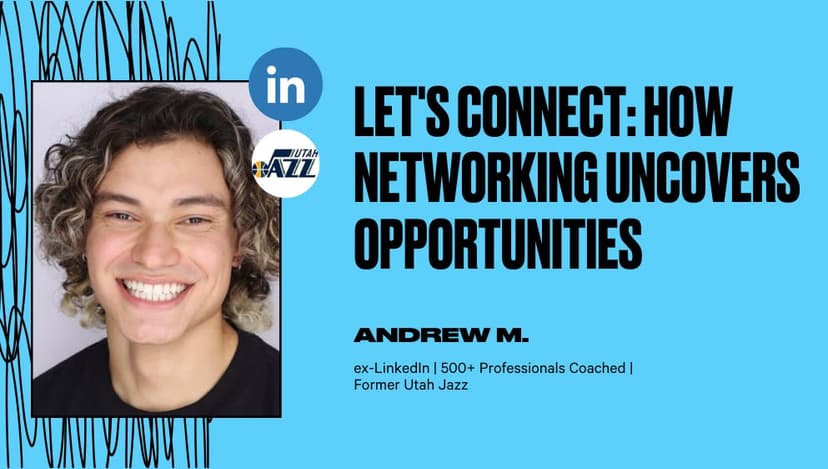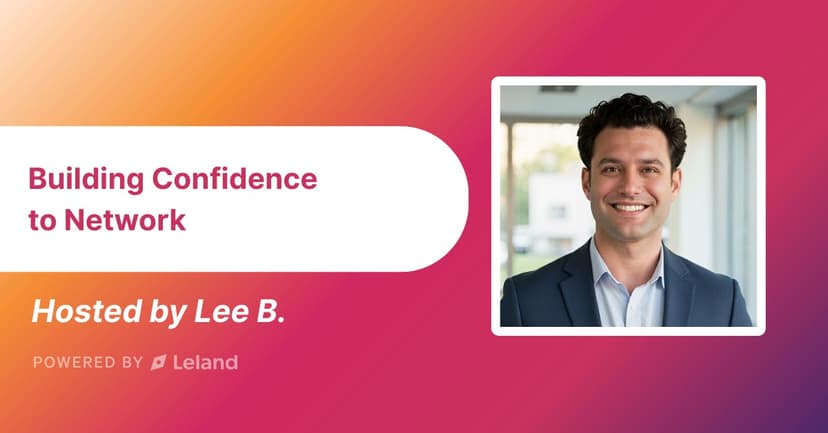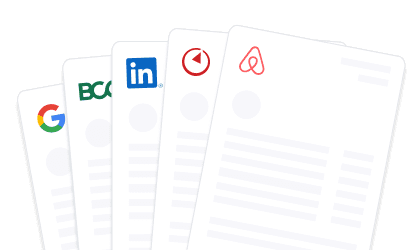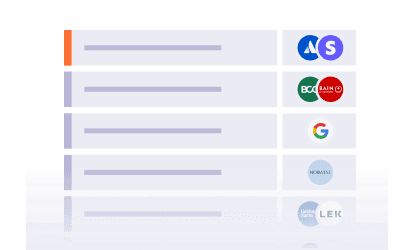25+ Questions To Ask At a Career Fair
Career fairs are a great way to build your network and get to know different companies. Asking good questions will set you apart from other students and show the companies why you are a good candidate for their internships/jobs.
Posted October 25, 2025

Join a free event
Learn from top coaches and industry experts in live, interactive sessions you can join for free.
Table of Contents
Career fairs offer valuable opportunities for students and job seekers to network with potential employers and learn about open roles, but they can be incredibly intimidating. Asking thoughtful questions at these events can set you apart and help you make a great impression on recruiters. Engaging in meaningful conversation shows your genuine interest in the company culture and ensures recruiters will remember you. This guide outlines effective questions to ask at a career fair and provides insights into preparing for these events to leave a lasting impact.
How to Prepare: Research Companies Before the Fair
Planning and preparation are key to a successful career fair experience. Candidates can first stand out by researching the companies attending, especially for whom they are interested in a future internship/job. Reviewing each company's website, recent news, job descriptions, company blog, and even the company’s Instagram account can help you ask informed, specific questions that make a good impression. Have they released any information on their values? Did they recently reach a major milestone? Sometimes you can find a kind of corporate statement of purpose on the site as well.
Showing knowledge about the company’s recent projects, values, or any shift taking place internally signals that a candidate is serious about exploring the right career or the very same jobs for them. This preparation also allows you to initiate a one-on-one conversation that feels relevant and personal, creating an actual verbal response from recruiters in a highly collaborative atmosphere where the company sounds approachable and engaging. Plus, if there is a specific job posting that you’re excited about, you could always bring it up during the conversation.
Expert Tip: “Remember that recruiters are humans, not robots. They like having conversations,” says Victoria Morell, a Muse career coach and Associate Director of Miami University Farmer School of Business Careers. “You always want to leave them with, ‘Oh I want to learn more about that person.’”
25+ Questions to Ask
General Questions To Break The Ice
Here are some general questions that are good to ask. It’s nice to start out with a general question before diving deeper into the company. These types of questions not only help establish a genuine personal connection but also reveal information about the company’s culture and goals.
- I know you guys are a [insert type of company or short description], can you tell me a little more about the company? – This is a good question to ask if you don’t know a whole lot about the company and want to learn more.
- What do you enjoy most about working here? – This question allows recruiters to share their experiences and provides insights into the company’s values.
- What are the biggest challenges facing your industry right now? – Asking this question demonstrates a big-picture mindset and interest in the company’s place in the larger business world.
- What qualities do your most successful employees share? What qualities do you screen for in interviews? – This question gives candidates a sense of what it takes to thrive within the company.
- Are there current opportunities available for students or recent graduates? What are you looking for in interns and more junior employees? – Directly asking about open roles shows that the candidate is serious about pursuing a position.
Questions About Specific Roles
For candidates interested in a particular role, asking specific questions can provide deeper insight into the typical day in that position. Trying to understand the team’s biggest goal or how the role impacts the company’s products and services shows a forward-thinking approach, which recruiters appreciate. It also shows that you’re invested (and gives you things to talk about in future interviews).
- Can you describe a typical day for someone in this role? – Understanding day-to-day responsibilities can clarify if the position aligns with the candidate’s skills and interests.
- What challenges might someone in this position face? – This question shows that the candidate is realistic and open to addressing challenges within the role.
- How does this role support the entire organization’s goals? – This demonstrates the candidate’s interest in the bigger picture.
- What skills or experience do you consider most important for success in this role? – This question can help candidates assess if they’re a good match culturally and in terms of skills.
- Is this a new position, or would I be filling a previous position? – This can give insight into the role’s history and how it has evolved.
Questions About the Application Process
Career fairs offer you a chance to gain clarity on the hiring process and understand what to expect if you decide to apply. These questions can help candidates get a clearer view of the interview process and expectations, setting them up for success if they choose to move forward.
- What does the application process look like after the career fair? – This shows genuine interest in taking the next steps and will help you make sure you’re adequately prepared for the rest of the hiring process.
- Are there any specific qualities or skills you look for that may not be listed in the job description? – This question allows candidates to gather valuable information that can enhance their application. The job description is a great place to start, and you should definitely look at the open roles beforehand, but they’re almost never comprehensive.
- Do you have any advice for someone applying for this role? – Many recruiters have insider tips that can help candidates tailor their applications.
- How long does the hiring process usually take? – Knowing this timeline helps candidates manage expectations.
- Are there internship or part-time opportunities available? – For students still in school, this shows eagerness to get involved before graduation. If you have a chance to look at the jobs beforehand, that’s better than asking the recruiter. No one wants to repeat information that can easily be found online.
Questions About Growth and Future Opportunities
Asking about growth potential and long-term opportunities can convey a commitment to building long-term relationships with the company. These kinds of questions can help you evaluate whether the company's culture aligns with its values and long-term goals.
- What does a typical career path look like for someone in this role? – Showing interest in growth opportunities emphasizes a commitment to professional development.
- Does the company promote from within? – This question demonstrates ambition and a desire for advancement in business careers or other careers.
- How does the company support its employees' professional growth? – This can provide insight into the company’s training and development programs.
- Are there opportunities for cross-departmental collaboration? – Gaining experience in different areas of the company shows interest in broadening skills and networking within the organization.
- Where do you see the company in five years? – This forward-thinking question shows that the candidate is considering how they might fit into the company’s vision for the future.
- Can you share examples of employees who have grown within the company? – This helps you gauge whether the company invests in its employees’ success and provides a sense of what growth might look like.
- How does the company identify and nurture high-potential employees? – This shows ambition and a desire to contribute meaningfully while understanding the company’s approach to talent development.
- What does success look like in this role after one year? Three years? – This focuses on tangible goals and growth expectations, giving you a clearer sense of career progression.
- How does the company adapt to changes in the industry to ensure long-term growth? – Reflects a forward-thinking mindset and interest in aligning your career with a resilient organization.
The Wrap-Up and Follow-Up
Ending the conversation on a positive note is essential to making a great impression. Here are a few questions to leave a lasting impact:
- What are the next steps if I’m interested in applying? – This makes the candidate’s intent clear and sets up expectations for what comes next.
- May I have your business card for follow-up questions? – Asking for contact information shows professionalism and eagerness to continue the conversation.
- Is there anyone else you recommend I speak with to learn more? – This question can open doors to further networking opportunities within the entire organization.
Being courteous and professional throughout the conversation, including expressing gratitude for the recruiter’s time, helps create a fantastic chat that recruiters will remember. Use these career fairs to build long-term relationships, not momentary, knowledge-grabbing interactions.
How to Brainstorm Your Own Questions
The questions listed here can hopefully serve as great inspiration. However, note that the best questions are often those that are hyper-specific to the company, the industry, the role you’re interested in, and your background.
- Lean into the research you did beforehand. Ask detailed questions about recent products, initiatives, or partnerships launched. Has the company pivoted or changed its strategy recently? Have there been any major changes to the C-Suite? These are all questions that’ll show the recruiter you did your homework.
- Leverage your background. This can help you craft questions that show you’ve thought deeply about your fit. If you have prior experience in a similar role or industry, ask about how the company approaches challenges you’ve faced before. For instance, “I’ve worked on implementing customer retention strategies – how does your team address customer loyalty?”
- Practice active listening and be curious. During the conversation, adapt your questions based on what the recruiter shares. If they mention a major upcoming initiative or a specific team’s focus, build on that topic. For example, “You mentioned the launch of a new platform – what qualities do you look for in candidates to support that effort?” Asking follow-up questions and clarifications is a great way to keep the conversation moving.
Some Final Tips
When attending a career fair, it’s not just about asking the right questions but also about engaging meaningfully. Maintaining eye contact, showing genuine interest, and listening attentively are essential. Recruiters can tell if a candidate is engaged and invested in learning about the company, which goes a long way in establishing a genuine personal connection.
You should also be mindful of the recruiter’s time; if there’s a long line behind them, sticking to a few key questions and offering to follow up later shows respect for the recruiter’s busy schedule. Finally, thanking the recruiter as they wrap up leaves a good impression that sets candidates apart from others at the event.
Career fairs are a valuable opportunity for candidates to engage face-to-face with potential employers. Asking thoughtful, relevant questions can make a strong impression, helping candidates stand out and build connections that could lead to offers for a consulting job, a business job, etc. By showing curiosity, preparation, and professionalism, candidates position themselves as memorable, promising candidates in the minds of recruiters.
The Bottom Line
Career fairs aren’t just about collecting company swag; they’re about making real connections that can lead to internships, job offers, and long-term career growth. By doing your research, asking thoughtful and specific questions, and staying engaged in every conversation, you give recruiters a reason to remember you. Whether you're exploring your options or targeting a specific role, your preparation and curiosity can set you apart from the crowd. Treat every interaction as the start of a professional relationship, not just a pitch, and you’ll walk away with more than just a flyer. You’ll leave a lasting impression.
Get Expert Advice from a Career Development Coach
Job seekers can connect with top career development coaches for expert guidance and strategies to stand out at career fairs and secure valuable job opportunities.
Read these next:
- How to Cultivate a Growth Mindset for Career Success
- 10 Career Development Questions to Ask Your Boss
- The Role of Mentors: How Guiding Relationships Can Shape Your Career
- How to Negotiate Your Salary – With Example Emails
- The Role of Mentors in Launching Your Venture Capital Career
- Top 10 Career Mentors
FAQs
Should I bring my resume to a job fair?
- Remember that companies attend job fairs to interview several people quickly. Your goal is to get past the first screening. Thank-you notes sound old-fashioned, but they are still a powerful tool for reminding recruiters about your qualifications. Always include a copy of your resume in the envelope.
How to not be nervous at a career fair?
- You have a lot to offer and employers are excited to meet you – they were once students too and know what it feels like to feel nervous talking to a recruiter.
What should I wear to a career fair?
- For most Job Fairs, the appropriate style of dress is “Business Casual”. What is Business Casual? Business Casual is crisp and neat, not overly dressy, and more classic than trendy.
Do I need a cover letter for a career fair?
- You are likely to hear conflicting advice on whether you need to bring both your CV and cover letter to job fairs. Although it is generally agreed that it is wise to take along your CV, some job sites suggest there is no need to prepare cover letters.
Is there an interview at the job fair?
- On-the-spot interviews happen at job fairs, so dress the part and be ready with copies of your resume in hand. As you introduce yourself, be mindful of your body language, including your handshake, eye contact, facial expressions, and voice. Employers take notice of job candidates who smile and exhibit enthusiasm.
Browse hundreds of expert coaches
Leland coaches have helped thousands of people achieve their goals. A dedicated mentor can make all the difference.



























